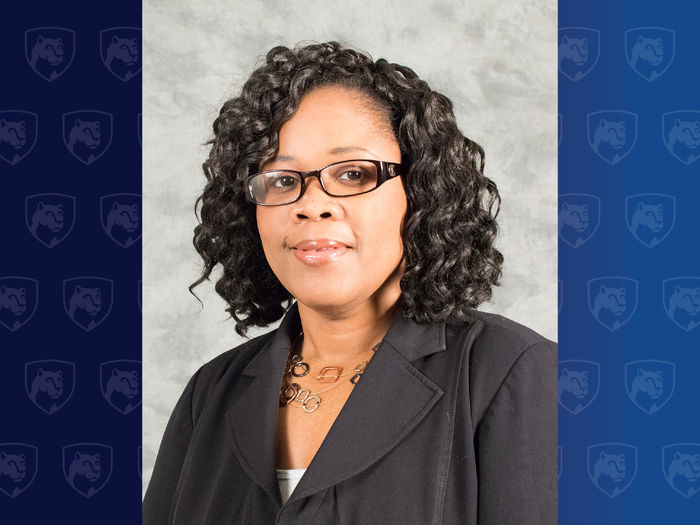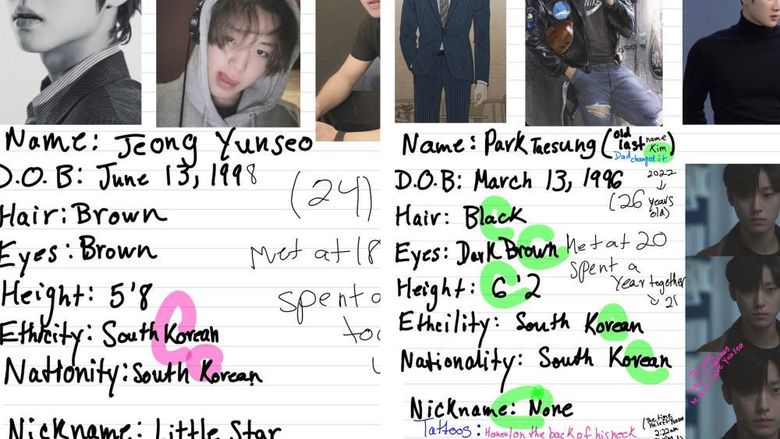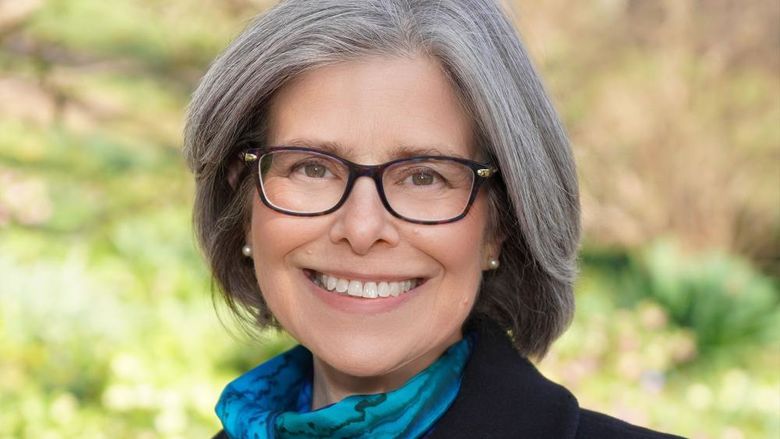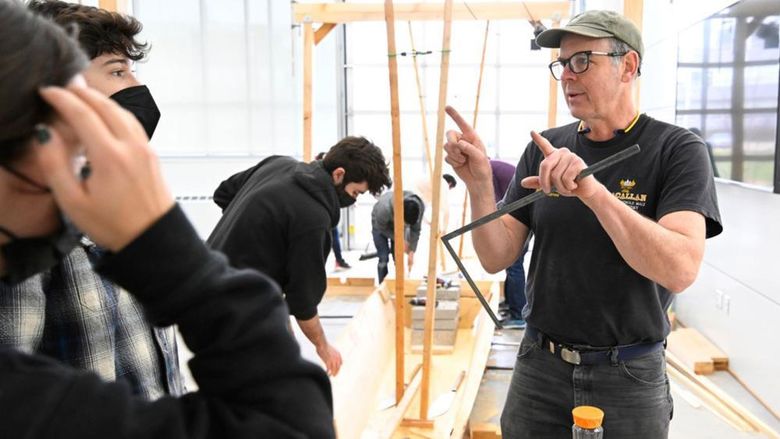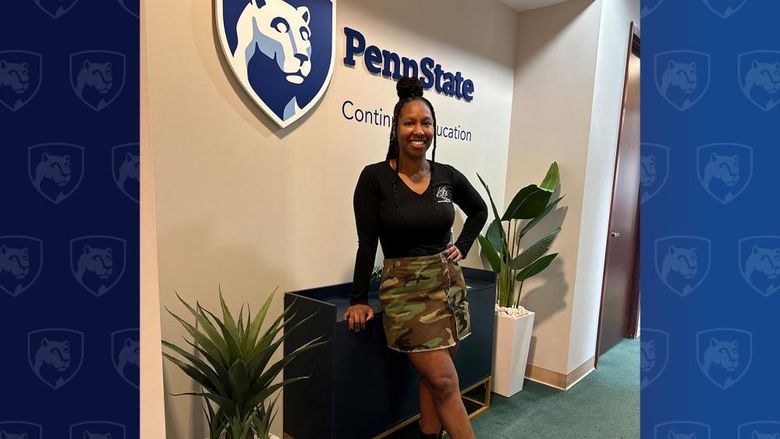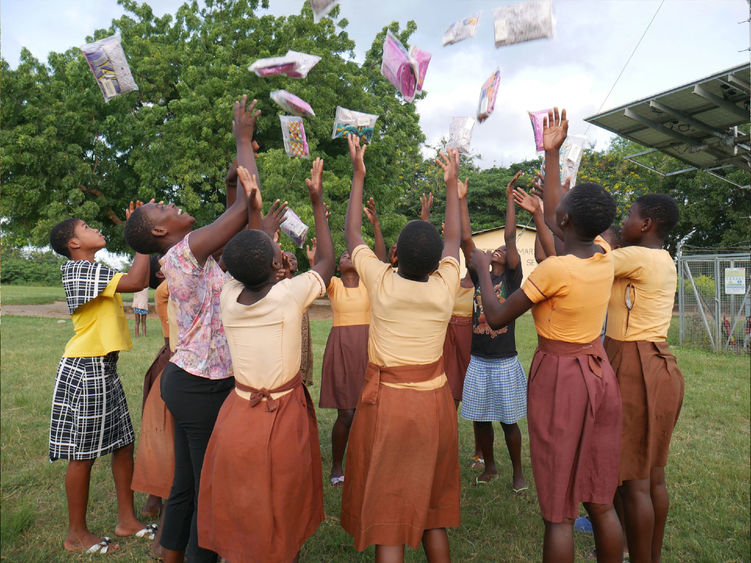
Young women in the Volta region of Ghana received packages of reusable period products and other hygiene items thanks to Keisha Johnson from Penn State Abington, who visited the nation with students as part of an English course. She initiated a feminine hygiene products drive after learning that taxes often preclude women and girls from purchasing the supplies.
ABINGTON, Pa. — When Keisha Johnson traveled to Ghana for 10 days with Penn State Abington faculty to support students enrolled in an embedded course, part of her motivation was to explore a nation that served as an exit point for millions of enslaved people who were shipped to America. But what Johnson didn't know was that she would be helping young women and girls who live 5,000 miles away from her Philadelphia home.
While the Abington group explored and engaged with citizens of the West African country, Johnson, the director of Residence Life and Community Standards at Abington, learned that young women often couldn’t afford to purchase period products.
“Condoms are free, but there’s this tax on women’s products. In terms of the struggle we face as women in the world, it really resonated with me. If a young girl doesn’t have the products she needs, she won’t be able to go to school, and there’s a domino effect attached to it,” she said.
“I was so moved by everything about Ghana, the heat, the history, the change in environment, and my interactions with people there. But there were other things that stuck with me like these girls who could benefit from our help in a real and meaningful way,” Johnson continued.
After she sat with this realization for a while, Johnson circled back to ADANU, the organization that hosted the Abington students in Ghana. She asked Richard Yinkah, the executive director of ADANU, if sending donations of period products would be feasible, and he quickly threw his support behind the project.
“The feminine hygiene drive is more than just providing essential products, it's about ensuring dignity, health and confidence. We can break down barriers, erase taboos, and create a world where every woman and girl can pursue their dreams unapologetically,” Yinnkah said.
Once she received the go-ahead from ADANU, Johnson created a flyer and an online wish list. Family, colleagues, friends, and friends of friends responded to the call with products and monetary donations.
“The response was beyond what I expected. My male friends came through in a big way. It also started conversations and expanded others. People wanted to know more, and I’m grateful for that. I want to keep the conversation going,” she said.
Johnson and Yinkah worked through the logistics, which were sometimes daunting due to shipping costs and import taxes, but they were able to send the mountain of products that Johnson stored in her living room.
She also learned about an organization in Ghana called Queens Royal Care that makes reusable period products, and sent them $200 she collected. Queens produced 60 sets of reusable pads, soaps, sanitary cleaning products and panty liners that were distributed at four schools in the Volta region of the country.
Ultimately, more than 60 students received packages of sanitary products. The team from Adanu conducted sessions on feminine hygiene to equip the young women with the knowledge and confidence to manage their menstrual health effectively.
“The feminine hygiene product drive made a significant impact on the lives of young girls in the Volta region by improving access to menstrual hygiene products, empowering them through education and awareness, and encouraging of local economic development through the purchase of reusable pads locally,” Yinkah said.
“The ripple effect of this endeavor will undoubtedly extend far beyond the immediate beneficiaries,” he said.
Johnson said she is considering ways to continue the drive, even if it’s just once a year.
“This drive may seem small, but it is meaningful to these young women. It gives girls options and helps them to not feel like they must catch up or hang back. It will hopefully make them understand the importance of education. We are saying education is important, and now here is a way we are removing a barrier,” she said.
“When we can make a difference in the world, we should," she added. "My life has had its challenges, but you should never lose sight of being blessed. You need to be a blessing."
Embedded course in Ghana: Spring 2025
Johnson joined Christina Riehman-Murphy, associate librarian, and Alisha Walters, associate professor of 19th century British literature, and Abington students enrolled in a course with required short-term international travel, also known as an embedded course.
This reimagined English course offered firsthand knowledge of the beautiful and sometimes traumatic cultural contexts that surround the creation of the literature and cultural documents that the students studied.
This embedded course to Ghana is scheduled for to repeat in the spring 2025 semester, but interested students should contact the Office of Global Programs as soon as possible to learn more.
About Penn State Abington
Penn State Abington provides an affordable, accessible and high-impact education resulting in the success of a diverse student body. It is committed to student success through innovative approaches to 21st-century public higher education within a world-class research university. With more than 3,100 students, Penn State Abington is a residential campus that offers baccalaureate degrees in 25 majors, accelerated master's degrees, undergraduate research, the Schreyer Honors College, NCAA Division III athletics and more.
